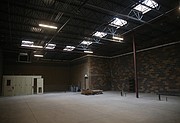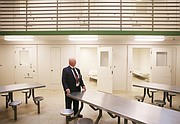Bad guys, your room is ready
Coeur d'Alene Press | UPDATED 7 years, 2 months AGO
By JUDD WILSON
Staff Writer
COEUR d’ALENE — A new 124-bed expansion of the Kootenai County Jail opened for business Monday.
The added space was “sorely needed,” said Kootenai County Sheriff Ben Wolfinger. “I’m sure glad it’s here.”
The sheriff, whose jail population has seen a high of 497 inmates at one point this year, said the approximately $1.2 million cost of annually operating the 22,000-square-foot expanded space will be offset by the savings gained by not having to ship Kootenai County inmates elsewhere. Around 100 inmates are currently housed in five other counties in Idaho and Washington.
Wolfinger anticipated moving inmates into the new space on Monday afternoon and noted that it would soon fill. The sheriff said the new spaces would be taken first by inmates with medical needs, and then others will be phased in over the next few weeks. However, he added, “We’ll still have to house some out of the county.”
The project was “one of the costs of a growing county,” said Wolfinger. “Infrastructure doesn’t always keep up with the growth in the community, and jails are always at the bottom of that list.”
Kootenai County Commissioner Marc Eberlein said the addition completes a 2001 plan, and came in more than $1 million under its original $12.5 million budget. The pair gave Sletton Corrections superintendent Todd Azinger credit for the accomplishment. Azinger said he was glad to have employed local companies and workers for almost everything in the expansion project.
In addition to the 124 new beds, the expansion did the rough preparations for a future 8,000-square-foot addition of 108 beds. The space is already enclosed, has its concrete flooring, and has otherwise been “roughed in,” said Azinger. One control room oversees both the new 124 beds, and will oversee the future 108 beds when they’re added.
The new space is divided into pods, one of which is for sick patients. Custody Lt. Kyle Hutchison said the jail badly needed the medical pod. Sick inmates are now kept in the booking area. Moving them to their own space will make the jail staff’s job easier and safer, he said.
Also unlike the previous jail expansion, the pods are easier to lock down because they’re divided into separate cells with locking doors.
Wolfinger said housing inmates in their community will help them rehabilitate because they’ll have more opportunities to see their family members, who to this point may have needed to travel to places such as Yakima, Wash., or Lewiston. He also said it would reduce liability to the county.
Felons make up 75-80 percent of the jail’s population, Wolfinger said.







